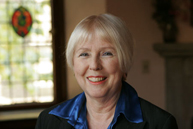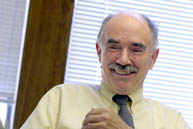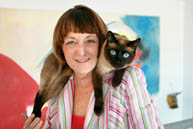Headliners: Intruders nabbed and contrarians speak out
Headliners: Intruders nabbed and contrarians speak out McGill University
User Tools (skip):
HEADLINERS
Intruders nabbed and contrarians speak out
McGill security passes muster
The ace reporters at Le Journal de Montréal are up to their investigative sleuthing again. Having already highlighted security risks at Trudeau Airport and MUTC garages by sneaking into authorized areas, journalists from Montreal's largest tabloid were able to enter buildings at U de M, UQAM and Polytechnique late at night. When the same bunch tried to breach McGill's perimeter, they were quickly intercepted by McGill security agents and thoroughly questioned. Maybe one day, Le Journal will go back to covering news instead of creating it.
Free-thinker fallout

Katherine Young is unafraid to say that universities may not be bastions of free speech.
Religion Prof Katherine Young was one of three academics featured in the most recent issue of University Affairs magazine. The trio, called the "contrarians," were chosen because they aren't afraid to express their views on contentious issues, no matter how many feathers they may ruffle. Young is known for co-authoring a pair of controversial books that suggest that proponents of ideological feminism have succeeded in convincing large segments of the population into believing that women are superior to men. In the article, Young goes on to say that despite universities being touted as bastions of freedom of speech, a surprisingly small number of academics choose to raise their voice against popular consensus.
Words not minced here

Desmond Morton busts the myth of peacekeeping.
Speaking of profs not afraid to speak their mind, Desmond Morton has weighed in once again on Canada's military mission in Afghanistan. Consistently one of Prime Minister Stephen Harper's harshest critics when it comes to Afghanistan, the military history professor told the Christian Science Monitor that with Canadian casualties on the rise and no real end in sight, people back home are feeling "massive disillusionment." To his credit, however, he also pulls no punches when discussing the general public's naive notions about the true nature of peacekeeping missions. "One of the great myths in Canada is that peacekeeping is sweet and nonviolent... like most nationalist illusions [it is] deeply held and stupid and immune to reason."
Buddy can you spare a kidney?

Margaret Somerville weighs in on the sale of human organs.
Fresh off the Massey lecture circuit, Margaret Somerville is at it again — this time weighing in on news that Immigration Canada has developed internal guidelines that can fast-track visa applications from people looking to donate organs in Canada. In a recent article in the Ottawa Citizen, advocates of the plan maintain that streamlined procedures could save lives, pointing to the fact that applicants must still undergo screening to ensure that no sale of human organs is taking place. While Somerville believes that fast-tracking is the right way to proceed in certain cases, the founding director of the McGill Centre for Medicine, Law and Ethics suggests that ethical implications get murky, especially when the donor is poor with no other means of subsistence.

